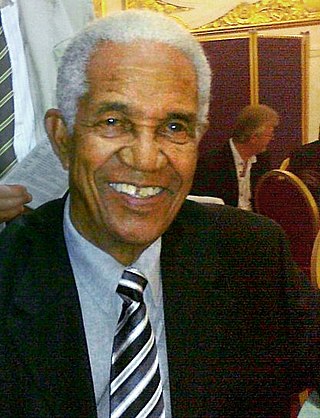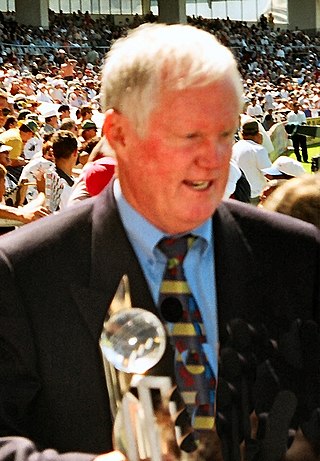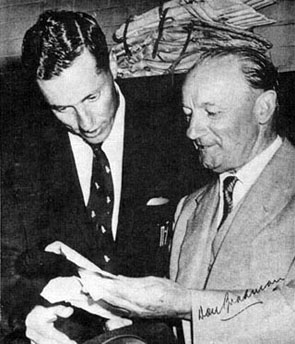Related Research Articles

Sir Garfield St Aubrun Sobers,, also known as Sir Gary or Sir Garry Sobers, is a former cricketer who played for the West Indies between 1954 and 1974. A highly skilled bowler, an aggressive batsman and an excellent fielder, he is widely considered to be cricket's greatest ever all-rounder and one of the greatest cricketers of all time.

Robert Graeme Pollock is a former cricketer for South Africa, Transvaal and Eastern Province. A member of a famous cricketing family, Pollock is widely regarded as one of South Africa's greatest ever cricketers, and as one of the greatest batsmen in the history of cricket. Despite Pollock's international career being cut short at the age of 26 by the sporting boycott of South Africa, and all but one of his 23 Test matches being against England and Australia, the leading cricket nations of the day, he broke a number of records. His completed career Test match batting average of 60.97 remains the third best behind Sir Don Bradman and Adam Voges.
Sir Wesley Winfield Hall is a Barbadian former cricketer and politician. A tall, strong and powerfully built man, Hall was a genuine fast bowler and despite his very long run up, he was renowned for his ability to bowl long spells. Hall played 48 Test matches for the West Indies from 1958 to 1969. Hall's opening bowling partnership with fellow Barbadian Charlie Griffith was a feature of the strong West Indies teams throughout the 1960s. Hall was one of the most popular cricketers of his day and was especially popular in Australia, where he played two seasons in the Sheffield Shield with Queensland.
Robert Maskew Cowper is a former cricketer who played Test cricket for Australia from 1964 to 1968, and Sheffield Shield cricket for Victoria and Western Australia from 1960 to 1970.
Graham Douglas McKenzie – commonly known as "Garth", after the comic strip hero – is an Australian cricketer who played for Western Australia (1960–74), Leicestershire (1969–75), Transvaal (1979–80) and Australia (1961–71) and was a Wisden Cricketer of the Year in 1965. He succeeded Alan Davidson as Australia's premier fast bowler and was in turn succeeded by Dennis Lillee, playing with both at either end of his career. McKenzie was particularly noted for his muscular physique and ability to take wickets on good batting tracks. His father Eric McKenzie and uncle Douglas McKenzie played cricket for Western Australia and Garth was chosen for the Ashes tour of England in 1961 aged only 20. He made his debut in the Second Test at Lord's, where his 5/37 wrapped up the England innings to give Australia a 5 wicket victory.

Peter John Parnell Burge was an Australian cricketer who played in 42 Test matches between 1955 and 1966. After retiring as a player he became a highly respected match referee, overseeing 25 Tests and 63 One Day Internationals.

Richard Charles Motz was a New Zealand cricketer. A right-arm fast bowler and hard-hitting lower order batsman, Motz played 32 Test matches for the New Zealand cricket team between 1961 and 1969. He was the first bowler for New Zealand to take 100 wickets in Test cricket.
Seymour MacDonald Nurse was a Barbadian cricketer. Nurse played 29 Test matches for the West Indies between 1960 and 1969. A powerfully built right-hand batsman and an aggressive, if somewhat impetuous, shotmaker, Nurse preferred to bat in the middle order but was often asked to open the batting. A relative latecomer to high-level cricket, Nurse's Test cricket career came to what many consider a premature end in 1969.
Bryan William Yuile is a retired cricketer who played 17 Test matches for New Zealand in the 1960s. He played first-class cricket from 1959 to 1972, until his religious objection to playing on Sundays led to the end of his career.
Gary Alex Bartlett is a former New Zealand cricketer. He played 10 Test matches for New Zealand in the 1960s as a fast bowler.

Douglas Thomas Ring was an Australian cricketer who played for Victoria and for Australia in 13 Test matches between 1948 and 1953. In 129 first-class cricket matches, he took 426 wickets bowling leg spin, and he had a top score of 145 runs, which was the only century of his career.

John William Gleeson was an Australian cricketer who played in 29 Test matches from 1967 to 1972. He is best known for his unique bowling style, which according to Cricket Australia CEO James Sutherland "bamboozled batsmen" and could "regularly dumbfound the best batsmen in any team".

Trevor Leslie Goddard was a Test cricketer. An all-rounder, he played 41 Test matches for South Africa from 1955 to 1970. He captained the young South African team on its five-month tour of Australia and New Zealand in the 1963–64 season, levelling the series with Australia, and was also captain in 1964–65 against England in South Africa.

David Bartlett Pithey was a Rhodesian cricketer who played in eight Tests for South Africa from 1963 to 1967. As well as playing for Rhodesia and Western Province, he played first-class cricket for Oxford University and Northamptonshire. Christopher Martin-Jenkins described him as "spasmodically brilliant". His brother, Tony, also played Test cricket for South Africa; they played together in five of the Tests on the 1963–64 tour of Australasia.
Roy Ivan Harford is a former New Zealand cricketer who played in three Tests against India in 1967–68. He played first-class cricket in New Zealand from 1965 to 1968.
Mark Gordon Burgess is a New Zealand former cricketer who played Test cricket from 1968 to 1980 and captained the New Zealand cricket team from 1978 to 1980. He was a right-handed batsman, and bowled right-arm off-breaks. He played in New Zealand's first One Day International (ODI) in 1973.

Michael John Froud Shrimpton was a New Zealand cricketer and coach.
This article describes the history of cricket in Pakistan from 1947 to 1970.
John William Grant is a former cricketer who played first-class cricket for Victoria from 1964 to 1969.
References
- ↑ Wisden 1968, p. 904.
- ↑ The Oxford Companion to Australian Cricket, Oxford, Melbourne, 1996, p. 281.
- ↑ Victoria v Western Australia 1966-67
- ↑ Wisden 1969, p. 887.
- ↑ Australia v India, Sydney 1967-68
- ↑ Les Joslin batting by season
- 1 2 Coverdale, Brydon (23 December 2015). "Australia's forgotten prodigy". The Cricket Monthly. Retrieved 30 July 2019.